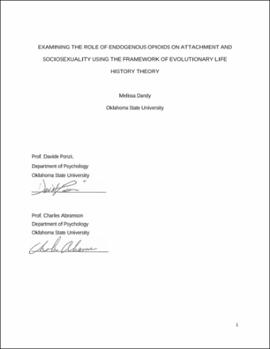| dc.contributor.author | Dandy, Melissa | |
| dc.date.accessioned | 2019-02-09T14:24:13Z | |
| dc.date.available | 2019-02-09T14:24:13Z | |
| dc.date.issued | 2017-12-11 | |
| dc.identifier | oksd_dandy1_HT_2017 | |
| dc.identifier.uri | https://hdl.handle.net/11244/317209 | |
| dc.description.abstract | Evolutionary life history theory has been used to examine individual differences in attachment and sociosexuality within adult romantic relationships. One proposed mechanism for the variation observed within individuals is the endogenous opioid system. Through the use of testosterone, endogenous opioids may cause decreases in mating effort and increases in parental care of long-term partnered persons. Using the framework of evolutionary life history theory, this review examines current literature on opioids, attachment, sociosexuality, and testosterone, and attempts to evaluate the potential role of the endogenous opioid system as the key underlying mechanism, which uses testosterone to mediate differences in adult romantic attachment and sociosexuality. | |
| dc.format | application/pdf | |
| dc.language | en_US | |
| dc.rights | Copyright is held by the author who has granted the Oklahoma State University Library the non-exclusive right to share this material in its institutional repository. Contact Digital Library Services at lib-dls@okstate.edu or 405-744-9161 for the permission policy on the use, reproduction or distribution of this material. | |
| dc.title | Examining the role of endogenous opioids on attachment and sociosexuality using the framework of evolutionary life history theory | |
| osu.filename | oksd_dandy1_HT_2017.pdf | |
| osu.accesstype | Open Access | |
| dc.type.genre | Honors Thesis | |
| dc.type.material | Text | |
| dc.contributor.director | Ponzi, Davide | |
| dc.contributor.facultyreader | Abramson, Charles | |
| thesis.degree.discipline | Psychology | |
| thesis.degree.grantor | Oklahoma State University | |
